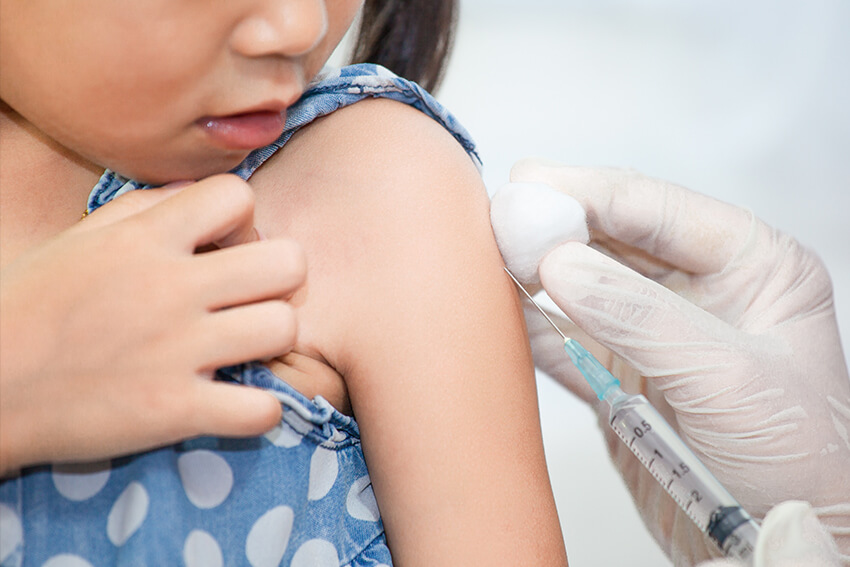Vaccines are an important part of family and public health
Did you know one of the best ways to protect your children is to make sure they have all of their vaccines? Some parents have questions about vaccines, especially about why they are important. Read on to learn about how vaccines work and their different benefits.
What are Vaccines and How Do They Work?
A vaccine is a way to give someone protection against an infection. Vaccines work by taking advantage of the response of our body’s immune system, which is how we defend ourselves against different germs.
When someone is infected with a germ, the body’s immune system activates white blood cells that create proteins called antibodies. Antibodies find and eliminate the infecting germ. Even after they’ve done their work, antibodies remain in the bloodstream and stay on the lookout for those same germs. That way, if the germs do come back, the antibodies are there to protect the body and prevent infection.
Vaccines contain weakened versions or inactivated toxins from bacteria and viruses. Once a vaccine is given, the body is tricked into thinking that it’s under attack from an infection without actually getting sick. This stimulates the response of the immune system and the creation of antibodies that provide protection.
Over time, the body may lose the antibodies initially provided by a vaccine, leaving it vulnerable to infection again. This is when a booster shot may be needed. Booster shots are designed to preserve immunity and keep the body infection-free for the future.
Why It Is Important to Vaccinate Your Child
Getting vaccines is the best way to prevent infectious disease. Just like exercising, eating healthy foods, and getting regular check-ups, vaccines play an important role in keeping you healthy. Here are a few reasons why routine vaccines are important:
- Vaccine-preventable diseases haven’t gone away. The bacteria and viruses that cause illness and death still exist and could be passed on to those who aren’t protected by vaccines.
- Vaccines will help keep you healthy. The Centers for Disease Control and Prevention (CDC) recommends routine vaccine throughout your life to protect against many infections. When you skip doses of a vaccine, you leave yourself vulnerable to illnesses like shingles, influenza, and more.
- Vaccines mean the difference between life and death. According to the CDC, every year approximately 50,000 adults die from vaccine-preventable diseases in the United States.
- Young and healthy people can get sick too. While infants and the elderly are at a greater risk of infectious disease, young and healthy people could get sick if they aren’t vaccinated.
Are Vaccines Safe?
Vaccines are given to millions of children and adults, so they are held to very high safety standards. This is why the process of developing vaccines is so long and complicated. During the pre-clinical stage, scientists work with laboratories to create and test vaccines. Then, the vaccines need to be tested with different groups of people to make sure that they are both safe and effective. These are called clinical trials. Clinical trials usually take years to complete, as they start with 20 to 100 participants before expanding to thousands of volunteers. All safety concerns must be addressed by the Food and Drug Administration (FDA) before a vaccine license is issued. Once a vaccine is licensed and recommended for use, the FDA, CDC, and other federal agencies continue to monitor its safety.
COVID-19 and Vaccines
Typically, it takes years for a vaccine candidate to move through the preclinical stage and various clinical trials. However, because of the crisis caused by the COVID-19 pandemic, Congress has approved billions of dollars of funding to speed up this process for a coronavirus vaccine. There are currently over 100 coronavirus vaccine candidates in the preclinical stage and seven vaccine candidates in clinical trials.
A lot of attention is being given to the development of a coronavirus vaccine, but it’s also important for children to continue receiving their routine vaccines. This will prevent other outbreaks of disease. In May 2020, the CDC published data that suggested vaccine rates have decreased significantly since COVID-19 was declared a national emergency. It’s thought that the stay-at-home orders and parent’s fears about COVID-19 have led to more children missing visits where vaccines would normally be given.
In response, many clinics around the country are doing everything possible to make these visits safer. This includes verbally screening patients for signs of illness, using separate waiting rooms and exam rooms for well and sick children, and increased attention to sanitation. Parents should continue to take children to their pediatrician to receive vaccines as they normally would.
Talk with physicians at your nearby Valleywise Community Health Center to learn more about why vaccines are important or call 1 (833) VLLYWSE to schedule an appointment.
Sources:
- https://www.passporthealthusa.com/2016/06/why-boosters-are-important/
- https://www.cdc.gov/vaccines/parents/why-vaccinate/vaccine-decision.html
- https://apic.org/monthly_alerts/five-important-reasons-to-vaccinate-your-child/
- https://www.healthychildren.org/English/safety-prevention/immunizations/Pages/Vaccine-Safety-The-Facts.aspx





